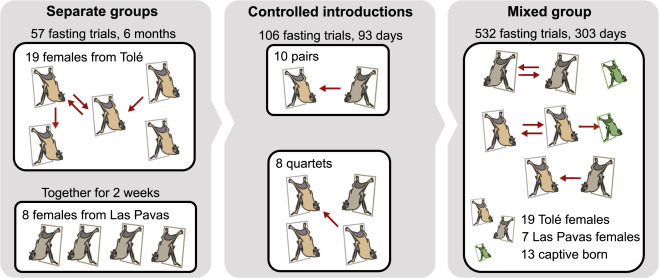Vampire bats sustain themselves on only blood, and if a bat is unable to feed for 3 days, it runs the risk of starving. Like early man, they have a 'boom and bust' foraging lifestyle, so they either hit it big and get a large blood meal or they're starved for that night.
If they starve three nights in a row there is a high chance they'll die but vampire bats with close social ties can be rescued from the brink.
To test how these bonds emerge, Ohio State University ecologist Gerald Carter and colleagues collected bats from Las Pavas and Tolé, Panamá, two geographically distant sites. Bats were then placed either in pairs--one from each location--or in small mixed cohorts. For each group, the research team withheld food from one of the bats and observed how it interacted with its cagemates. Several bats, particularly those in the pairs, began grooming one another more over time, and in some cases, this eventually led to sharing blood with underfed companions.

Groups of bats were gathered from two different sites (colors), then they induced and sampled food-sharing and grooming events between bats that were either previously familiar (same site) or unfamiliar (different sites). Red arrows depict hypothetical food donations during repeated fasting trials.
"Even if you remove all ectoparasites from their fur, they still groom each other more than necessary for just hygiene," says Carter. "We think of social grooming as a kind of a currency--a way to gain tolerance and bond with another individual."
Furthermore, Carter suggests the increased grooming over time demonstrates "raising the stakes" of friendship. The idea of "testing the waters" or "raising the stakes" to build cooperative relationships was first proposed in a theory paper in Nature in 1998, but it has been difficult to demonstrate in animals. "When you make a cooperative investment in another individual, there is a kind of risk, because if you have a bad partner, you can be even worse off than if you had just avoided them altogether," he says. "So, what you could do is invest a little bit to test the waters. Then, if they invest back in you, that's a signal to ramp up your investment, and so on."
If pairs raise the stakes enough, one might provide food by regurgitating blood into the mouth of a hungry partner. Visually resembling a sort of French kiss, "food sharing in vampire bats is like how a lot of birds regurgitate food for their offspring. But what's special with vampire bats is they do this for other adults, eventually even with some previous strangers," says Carter. These social interactions could be a fundamental step in creating bonds that last years in vampire bats--some unrelated pairs have been found to travel together for more than a decade.
"The idea of using low-cost behaviors to build up to higher-cost investments can be something of much more general importance outside just food sharing in vampire bats," says Carter. This idea could be applied to other social animals such as primates and could provide insight into how humans build relationships.





Comments